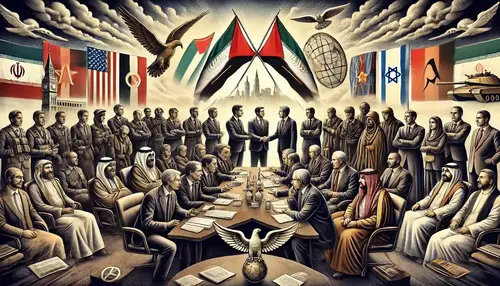jfid – FamilyMart, who isn’t familiar with this Japanese convenience store franchise? With its striking green and blue logo, FamilyMart offers a variety of products and services that make everyday life easier.
From food, drinks, books, tickets, to ATMs, FamilyMart has become a favorite choice for many people in various countries.
However, behind the success and convenience offered by FamilyMart, there is a dark story that may not be known to many. A story related to conflict, violence, and genocide in the Middle East, between Israel and Palestine.
Yes, FamilyMart apparently has a business relationship with Israel, through its parent company, Itochu Corp. Itochu Corp is one of the largest conglomerates in Japan, operating in various fields, including trading, textiles, energy, chemicals, food, and technology.
One of Itochu Corp’s subsidiaries is Itochu Aviation, which in March 2023 signed a memorandum of understanding (MoU) with Nippon Aircraft Supply and Elbit Systems Ltd, an international military technology company and defense contractor based in Israel.
Elbit Systems Ltd is Israel’s largest privately-owned weapons company, providing a variety of defense systems such as radar, drones, fighter jets, tanks, missiles, and firearms.
Elbit Systems Ltd is also known as a major contributor to the Israeli military, involved in brutal attacks on Palestinian civilians in the Gaza Strip.
According to Amnesty International reports, Elbit Systems Ltd is one of the companies supplying weapons used by Israel to commit human rights violations and war crimes against Palestine.
Elbit Systems Ltd is also involved in the construction of the Israeli Separation Wall, which isolates and discriminates against Palestinian residents in the West Bank.
The collaboration between Itochu Aviation and Elbit Systems Ltd is based on a request from the Japanese Ministry of Defense to import defense equipment for the Self-Defense Forces needed for Japan’s security. However, this collaboration has also sparked controversy and criticism, both domestically and internationally.
Domestically, Japanese people concerned about the fate of Palestine condemn and reject this collaboration. They believe that this collaboration contradicts Japanese values, as well as the Itochu Group’s sustainability charter, which states the company’s commitment to contributing to sustainable social development and respecting human rights.
They also believe that this collaboration violates Japan’s three non-nuclear principles, which are not to produce, possess, or allow nuclear weapons in Japan’s territory.
They are concerned that this collaboration will open opportunities for Israel to introduce nuclear weapons into Japan, or even use Japan as a training ground.
To voice their rejection, Japanese citizens have staged various protest actions and demonstrations outside the headquarters of Itochu Corp and Itochu Aviation in Tokyo. They also call for a boycott of products related to Itochu Corp, including FamilyMart.
This boycott of FamilyMart also receives support from the international community, especially from Muslim countries sympathetic to the Palestinian struggle.
This boycott certainly has a negative impact on FamilyMart’s business, which has more than 24,000 outlets worldwide, including in Indonesia, Malaysia, Thailand, Vietnam, the Philippines, Taiwan, South Korea, China, and the United States. FamilyMart also feels pressure from its business partners, who are concerned about the repercussions of this boycott.
Finally, after facing immense pressure, Itochu Corp decided to terminate its collaboration with Elbit Systems Ltd at the end of February 2024.
This decision was also influenced by the preliminary decision of the International Court of Justice (ICJ) stating that Israel must prevent genocide actions in Gaza and facilitate humanitarian aid.
FamilyMart, through its official statement, welcomed this decision by Itochu Corp. FamilyMart reaffirmed its stance that they do not support violence or murder, and do not contribute to, donate to, or deal with Israel.
FamilyMart also hopes that the boycott against them can end soon, and they can restore good relations with their customers and business partners.
However, is Itochu Corp’s decision enough to end the boycott against FamilyMart? Are Japanese and international communities satisfied with the steps taken by Itochu Corp? Is the conflict between Israel and Palestine approaching a peaceful resolution?
The answer, of course, is no. Itochu Corp’s decision is just one of many examples of how multinational companies are involved in complex and protracted global conflicts. Conflicts that involve not only political, economic, and military interests but also identity, religion, and humanity.
The boycott against FamilyMart is also just one of many examples of how civil society seeks to voice their aspirations and solidarity with important and urgent global issues.
Boycotts that aim not only to exert economic pressure but also to convey moral and ethical messages.
The conflict between Israel and Palestine is also just one of many examples of how the world is still filled with injustice, inequality, and indifference. Conflicts that not only cause loss of life, injury, and suffering but also threaten world peace, stability, and security.
FamilyMart, Israel, and the ongoing boycott. This is a story that illustrates how complicated and challenging life is in an increasingly globalized and interconnected world.
This is a story that invites us to think and act critically and responsibly. This is a story that challenges us to be part of the solution, not the problem.















